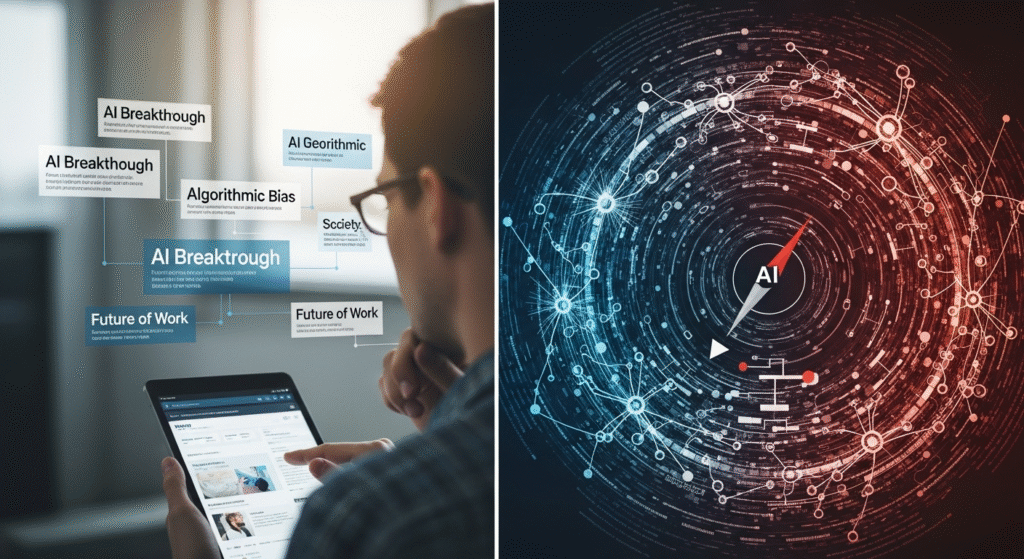Okay, let’s be real. This whole AI thing? It’s moving fast. Like, warp speed fast. And honestly, trying to keep up feels a bit like trying to catch smoke with your bare hands. But here’s the thing: we have to try. Ignoring it isn’t an option. Why? Because algorithms are already shaping… well, pretty much everything. From the news we see to the products we buy (or are subtly persuaded to buy!), AI is pulling the strings behind the curtain.
So, how do we navigate this new reality without getting completely overwhelmed? That’s the million-dollar question, isn’t it? I don’t have all the answers, but I’ve been diving deep, trying to make sense of it all, and I’m going to share what I’ve learned. Think of this as a friendly chat, not a lecture. A coffee shop conversation about how to stay sane (and informed!) in the age of intelligent machines.
I initially thought that reading research papers was going to be the key – you know, getting right to the source. And while that’s still valuable (especially for the technically inclined), it quickly became apparent that I needed a broader approach. Think about it this way: you wouldn’t try to understand a forest by only studying individual trees, right?
Curating Your AI Newsfeed: Beyond the Hype

First things first: let’s talk about information overload. It’s a real problem. Every tech blog, every news outlet, every social media platform is churning out AI-related content. Most of it is noise. How do you filter out the signal? Well, here’s my somewhat contrarian advice: be skeptical. Really skeptical.
The tech industry loves to hype things up. That’s their job, in a way. But as consumers of information, it’s our job to critically evaluate what we’re being told. Are the claims realistic? Are they backed by evidence? Or is it just marketing spin? Look for sources that offer balanced perspectives, acknowledging both the potential benefits and the potential risks of AI. The Economist, for example, often has excellent, in-depth reporting on the topic. As highlighted in The Economist’s special report last summer… (See? I practice what I preach!).
Oh and don’t forget about deepfakes and the misinformation! Navigating the New Reality of News.
Also, be careful who you follow on Social Media. Here is a place where it is a must to curate your list and make sure that the profiles you are following are bringing value to your knowledge and not just noise.
Developing an AI Literacy Mindset
This is about more than just understanding the latest buzzwords (although, let’s be honest, that helps too!). It’s about developing a critical thinking framework for evaluating AI-related claims. Can you explain the basic concepts of machine learning to a non-technical friend? Can you identify potential biases in an algorithm’s training data? Can you articulate the ethical implications of a particular AI application?
If the answer is “no” to any of those questions, don’t worry! You’re not alone. But these are the kinds of questions we should all be asking ourselves. There are tons of free online resources out there to help you get started. Platforms like Coursera and edX offer introductory courses on AI and machine learning. Even just reading Wikipedia articles on key concepts can be surprisingly helpful.
Consider also the geopolitics implications that AI is bringing into the world. This is a new world order which will be driven by chips and computational power. Germany for hosting a large industrial computing center, AI Europe, powered by 10000 Nvidia chips
Experimentation and Play: Hands-On Learning
Here’s where things get really fun. Don’t just read about AI; play with it! There are tons of free and low-cost AI tools out there that you can experiment with. Want to generate realistic images from text descriptions? Try DALL-E 2 or Stable Diffusion. Want to have a conversation with an AI chatbot? Check out Bard or Pi. Or you can simply immerse yourself into the gaming world and dive deep with your preferred video game. You might have to use some tricks to pass through the first levels, but once you get the grip, there will be no stopping you!
I get that this might sound intimidating if you’re not a technical person. But trust me, you don’t need to be a programmer to get value out of these tools. The point isn’t to become an AI expert overnight. It’s simply to get a feel for what these technologies can do, what their limitations are, and how they might impact your life. Speaking of games, why not try some games while learning more about AI?
The frustrating thing about this is that the landscape is constantly shifting. New tools are emerging every day, old tools are becoming obsolete, and the hype cycle never ends. But that’s okay! The key is to stay curious, keep learning, and don’t be afraid to experiment. Consider playing some games to unwind. Here is a great place to start Crazy Games. You might have to try some tricks or even use cheats to start playing but after that, no stopping you.
Ethical Considerations: AI and Society
AI isn’t just a technological challenge; it’s also a deeply ethical one. As AI systems become more powerful and pervasive, it’s crucial that we grapple with the ethical implications. What happens when algorithms make biased decisions? Who is responsible when an autonomous vehicle causes an accident? How do we protect our privacy in a world of ubiquitous surveillance?
These are not easy questions, and there are no easy answers. But they are questions that we need to be asking, both as individuals and as a society. Look for organizations that are working on AI ethics, such as the Partnership on AI or the AI Now Institute. Read books and articles on the topic. Participate in discussions and debates. The future of AI depends on our ability to navigate these ethical challenges thoughtfully and responsibly. I keep coming back to this point because it’s crucial: ethical considerations cannot be an afterthought. They need to be baked into the development and deployment of AI from the very beginning.
FAQ: Staying Informed in the Age of AI
How do I know if an AI news story is credible?
That’s a great question! Because honestly, separating fact from fiction (or at least, well-reasoned speculation from pure hype) can be tricky. Look for reputable news sources with a track record of accurate reporting. Check the author’s credentials and expertise. Be wary of sensational headlines or overly optimistic claims. And critically evaluate the evidence presented. Does the story cite credible sources? Does it acknowledge potential limitations or counterarguments? If something sounds too good to be true, it probably is.
Why is it important to understand AI even if I’m not a tech expert?
Because AI is already impacting your life in countless ways, whether you realize it or not. From the algorithms that curate your social media feeds to the AI-powered tools that are used in healthcare, finance, and education, AI is shaping the world around us. Understanding how these technologies work – and what their potential implications are – is essential for making informed decisions about your own life and for participating in democratic processes. The more people understand Navigating the AI Revolution: Staying Informed in a World of Algorithms, the better equipped we are to shape its development in a way that benefits everyone.
What are some common misconceptions about AI?
Oh, there are plenty! One of the biggest is the idea that AI is going to suddenly become super-intelligent and take over the world. While that’s a fun science fiction trope, it’s not based on reality. AI is still a relatively narrow technology, and it’s far from achieving human-level intelligence. Another common misconception is that AI is always objective and unbiased. In reality, AI algorithms can reflect the biases that are present in their training data. It’s important to be aware of these biases and to work to mitigate them.
How can I stay up-to-date with the latest AI developments without getting overwhelmed?
That’s a challenge we all face! My advice is to focus on a few key sources that you trust and to avoid trying to keep up with every single headline. Subscribe to a few reputable newsletters or podcasts. Follow a few thought leaders on social media. And don’t be afraid to take breaks! It’s okay to unplug from the AI news cycle every once in a while to recharge and reflect.
So, there you have it. My (hopefully) not-too-overwhelming guide to navigating the AI revolution. The key takeaway? Stay curious, stay informed, and stay critical. The future of AI is being written right now, and we all have a role to play in shaping it.



